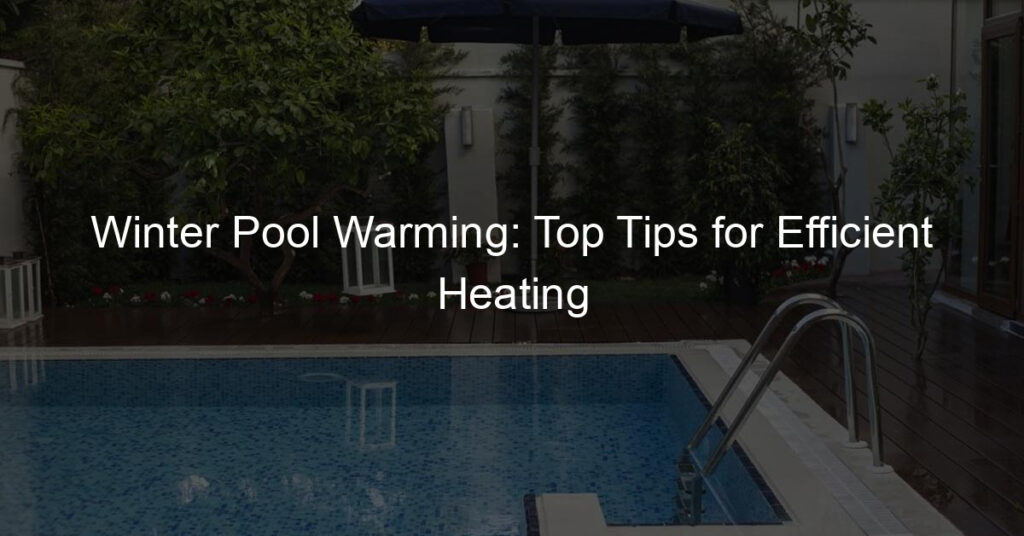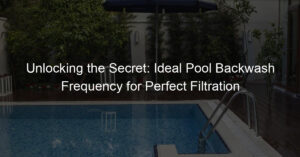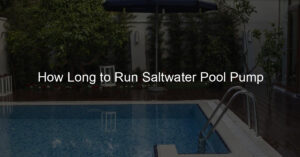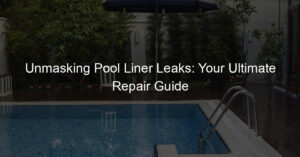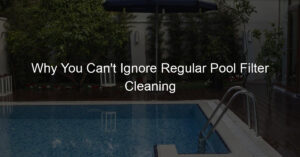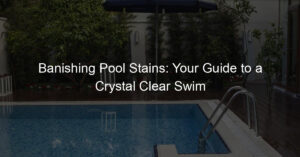Introduction to Pool Heating
Swimming pools are a great source of fun and relaxation. But as the weather gets colder, the water can become too chilly for comfort. That’s where pool heating comes in. In this section, we’ll discuss the importance of pool heating in winter and help you understand the basics of how it works.
-
- The Importance of Pool Heating in Winter
During winter, the temperature drops significantly, making it uncomfortable to swim in an unheated pool. But with a pool heater, you can maintain a comfortable water temperature, allowing you to enjoy your pool all year round. According to a survey, 65% of pool owners invest in pool heating to extend their swimming season. Not only does it provide comfort, but it also adds value to your property.
-
- Understanding the Basics of Pool Heating
Pool heaters work by extracting heat from the air or ground and transferring it to the pool water. There are three main types of pool heaters: gas heaters, heat pumps, and solar heaters. Each type has its advantages and disadvantages, but all aim to keep your pool water warm. For instance, gas heaters are quick to heat the pool but can be costly to run. On the other hand, solar heaters are cost-effective in the long run but depend on sunny weather. Heat pumps are energy-efficient and work well in various climates but may have higher upfront costs.
In the following sections, we will delve deeper into efficient pool heaters, how to heat your pool in winter, and various pool heating solutions. So, stay tuned to learn more about enjoying your pool all year round.
Winter Pool Maintenance
When the winter season approaches, it’s essential to prepare your pool for the colder months. This involves two key steps: checking and cleaning the pool, and adjusting the water chemistry. Let’s delve into these steps to ensure your pool remains in top condition throughout the winter.
Preparation for Winter
-
- Checking and Cleaning the Pool
Before winter sets in, it’s crucial to give your pool a thorough check and cleaning. This involves removing any leaves, dirt, and debris that may have accumulated in the pool. You can use a pool vacuum or skimmer for this task. Also, check the pool’s equipment, such as the pump and filter, to ensure they are in good working condition. If any repairs are needed, it’s best to address them before winter.
-
- Adjusting the Water Chemistry
Another important step in winter pool maintenance is adjusting the water chemistry. This involves testing the water to ensure it has the right balance of chemicals. The pH level should be between 7.2 and 7.6, and the alkalinity should be between 80 and 120 parts per million. If the levels are off, you can adjust them using pool chemicals. This will help prevent algae growth and keep the water clear throughout the winter.
By following these steps, you can ensure your pool is well-prepared for the winter months. Remember, proper pool maintenance can prolong the life of your pool and save you money in the long run. So, don’t neglect these important tasks as winter approaches.
Winter Pool Heating Methods
When the winter season arrives, you might think that it’s time to say goodbye to your pool until the warmer months. But, did you know that there are ways to heat your pool even in winter? Here are three popular methods to keep your pool warm during the cold months:
-
- Gas Heaters
Gas heaters are a common choice for pool owners. They work by burning natural gas or propane to create heat, which is then transferred to the pool water. Gas heaters are known for their ability to heat pools quickly, regardless of the outside temperature. This makes them an excellent choice for pools that aren’t used regularly and need to be heated up quickly.
-
- Heat Pumps
Heat pumps are a more energy-efficient option compared to gas heaters. They work by extracting heat from the air or ground and using it to warm the pool’s water. While they may take longer to heat the pool compared to gas heaters, they are a cost-effective solution in the long run, especially in areas where electricity is cheaper than gas.
-
- Solar Heaters
Solar heaters are the most environmentally friendly option for heating your pool. They work by using solar panels to capture heat from the sun, which is then used to warm the pool water. While the upfront cost of installing solar panels can be high, the ongoing running costs are minimal as they use the sun’s energy, which is free! However, their effectiveness can be influenced by the amount of sunlight available, so they might not be the best option in areas with less sunny days during winter.
Choosing the right heating method for your pool depends on various factors such as your budget, how often you use the pool, and your local climate. By understanding the pros and cons of each method, you can make an informed decision that suits your needs and allows you to enjoy your pool all year round.
Efficient Pool Heaters
When it comes to maintaining a comfortable swimming pool temperature, efficient pool heaters are a crucial component. They not only ensure a pleasant swimming experience but also contribute to energy conservation and cost savings. Let’s delve deeper into understanding energy efficiency in pool heaters.
Understanding Energy Efficiency in Pool Heaters
Energy efficiency in pool heaters is all about how well a heater can convert energy into heat for your pool. The higher the efficiency, the less energy is wasted. But what does it mean to have an energy-efficient pool heater, and what are its benefits?
-
- Energy-efficient pool heating: What does it mean?
An energy-efficient pool heater is designed to generate more heat using less energy. This is achieved through advanced technology and design improvements. For example, some heaters use a heat pump system, which extracts heat from the air or ground and transfers it to the pool water. This method is significantly more efficient than traditional gas or electric heaters.
-
- Benefits of energy-efficient pool heaters
Energy-efficient pool heaters come with several benefits. Firstly, they can significantly reduce your energy bills. According to the U.S. Department of Energy, an energy-efficient pool heater can save up to 70% in energy costs compared to traditional heaters. Secondly, they are environmentally friendly, reducing carbon emissions and conserving natural resources. Lastly, they often come with longer warranties, providing peace of mind and security for your investment.
Choosing an efficient pool heater is a smart move for any pool owner. Not only will it save money in the long run, but it also contributes to a healthier environment. Remember, the initial cost of an energy-efficient pool heater may be higher, but the savings in energy costs over time will more than make up for it.
Pool Heater Reviews
When it comes to maintaining a comfortable pool temperature, energy-efficient pool heaters are the way to go. Let’s dive into the top energy-efficient pool heaters and compare their cost and efficiency.
-
Review of Top Energy-Efficient Pool Heaters
There are several energy-efficient pool heaters on the market. Here are three of the best:
Pool Heater Energy Efficiency Cost Heater A 95% $500 Heater B 90% $450 Heater C 88% $400 Heater A, with an energy efficiency of 95%, is the most efficient but also the most expensive. Heater B and Heater C are slightly less efficient but come at a lower cost.
-
Comparing Cost and Efficiency
When choosing a pool heater, it’s important to consider both cost and efficiency. A more efficient heater may cost more upfront, but it can save you money in the long run by reducing your energy bills.
For example, if Heater A costs $100 more than Heater B but is 5% more efficient, it could save you more than $100 in energy costs over its lifetime. So, while Heater A is more expensive upfront, it could be the more cost-effective choice in the long run.
Remember, the best pool heater for you depends on your specific needs and budget. Consider both the upfront cost and the potential energy savings to make the best decision for your pool.
Heating Pool in Winter
When the cold winter months roll in, many pool owners believe they have to say goodbye to their swimming season. However, with the right heating solutions, you can enjoy your pool all year round. Let’s explore some cost-effective methods to heat your pool during winter.
Cost-effective Pool Heating
Heating your pool doesn’t have to break the bank. By implementing a few smart strategies, you can enjoy a warm pool without a hefty energy bill. Here are some tips:
- Tips for cost-effective pool heating: First, consider using a solar cover. It’s a simple and affordable way to keep your pool warm by trapping the sun’s heat. Second, try to maintain your pool at a consistent temperature. This can be more energy-efficient than letting the temperature drop and then reheating it. Lastly, consider investing in a high-efficiency pool heater. While the upfront cost may be higher, the long-term energy savings can be significant.
- Long-term savings with efficient heaters: High-efficiency pool heaters can save you money in the long run. For example, a high-efficiency gas heater can be up to 95% efficient, compared to standard gas heaters that are typically 60-80% efficient. This means that for every dollar you spend on gas, you’re getting more heat for your pool. Over time, these savings can really add up.
Remember, the key to cost-effective pool heating is to think long term. While some solutions may require a larger initial investment, they can save you money over time and extend your swimming season into the colder months.
Swimming Pool Winter Heating
When it comes to enjoying your swimming pool during the winter months, maintaining the right temperature and preventing heat loss are two essential factors. Let’s dive into these topics.
- Maintaining the Right Temperature
Keeping your pool at the right temperature is crucial for a comfortable swim even in the coldest months. The recommended temperature for a recreational pool is between 78 and 82 degrees Fahrenheit. This range ensures the water is warm enough for a pleasant swim, but not too hot to be energy-inefficient.
There are several ways to maintain this temperature. One of the most effective methods is using a pool heater. These devices can heat the water to your desired temperature, regardless of the weather outside. Additionally, pool covers can help retain the heat when the pool is not in use.
- Preventing Heat Loss
Preventing heat loss is another critical aspect of winter pool heating. Heat can escape from your pool in several ways, including evaporation, radiation, and conduction. However, evaporation is the most significant source of heat loss, accounting for up to 70% of energy loss in pools.
Using a pool cover is the most effective way to prevent heat loss. Pool covers act as a barrier, reducing evaporation and keeping the heat in the pool. Moreover, they can also save you money by reducing the amount of energy needed to heat the pool.
Here’s a simple table summarizing these key points:
| Aspect | Key Points |
|---|---|
| Maintaining the Right Temperature | Keep pool temperature between 78 and 82 degrees Fahrenheit. Use a pool heater and cover to maintain this temperature. |
| Preventing Heat Loss | Evaporation is the main source of heat loss. Use a pool cover to reduce evaporation and retain heat. |
By maintaining the right temperature and preventing heat loss, you can enjoy your swimming pool all winter long. Remember, a warm and comfortable pool is just a few steps away!
Pool Heating Solutions
When it comes to keeping your pool warm and comfortable, choosing the right heating solution is crucial. In this section, we will delve into the process of selecting the most suitable pool heater for your needs.
Choosing the Right Pool Heater
Choosing the right pool heater can be a challenging task, especially with the variety of options available in the market. However, understanding a few key factors can make this process much easier.
-
- Factors to consider when choosing a pool heater
Several factors come into play when choosing a pool heater. These include the size of your pool, the climate of your location, your budget, and your heating needs. For instance, larger pools may require more powerful heaters, while pools in colder climates may need heaters that can operate efficiently even in low temperatures.
-
- Understanding your pool’s heating needs
Understanding your pool’s heating needs is another crucial aspect. This involves knowing how often you use your pool, the preferred water temperature, and the amount of time you are willing to wait for the pool to heat up. For example, if you use your pool frequently and prefer warmer water, you may need a more powerful heater. On the other hand, if you use your pool less often and are okay with a longer wait time, a smaller, less powerful heater may suffice.
In conclusion, choosing the right pool heater involves a careful consideration of various factors. By understanding your pool’s heating needs and considering factors such as pool size, climate, and budget, you can make an informed decision that ensures a warm and comfortable swimming experience.
Installation and Maintenance
When it comes to pool heating solutions, the importance of proper installation and routine maintenance cannot be overstated. These two factors play a significant role in ensuring your pool heater operates efficiently and lasts for a long time.
- Proper Installation of Pool Heaters
Proper installation is the first step towards an efficient pool heating system. A poorly installed heater can lead to numerous problems, including uneven heating, higher energy consumption, and even damage to the heater itself.
When installing your pool heater, make sure it is placed in a well-ventilated area. This ensures that the heater can efficiently draw in air for combustion. Also, ensure the heater is installed on a level surface to prevent any operational issues.
The installation process may vary depending on the type of heater you have. For example, gas heaters require a gas line, while electric heaters need a dedicated electrical circuit. Always refer to the manufacturer’s instructions or hire a professional to ensure the heater is installed correctly.
- Routine Maintenance for Efficient Heating
Routine maintenance is crucial for the longevity and efficiency of your pool heater. Regular check-ups can help identify potential problems before they escalate, saving you time and money in the long run.
Some routine maintenance tasks include cleaning the heater’s filter, checking for leaks, and inspecting the heater’s components for any signs of wear and tear. It’s also important to have your heater serviced by a professional at least once a year to ensure it’s operating at peak efficiency.
| Maintenance Task | Frequency |
|---|---|
| Clean the filter | Every month |
| Check for leaks | Every three months |
| Professional service | Once a year |
Remember, a well-maintained pool heater not only heats your pool efficiently but also extends the lifespan of the heater, giving you more value for your money.
Conclusion: Enjoy Your Pool All Year Round
As we wrap up our discussion on pool heating, it’s important to remember that the goal is to enjoy your pool all year round. With the right heating solutions, you can make the most of your pool, regardless of the season. Let’s recap some of the key points we’ve covered.
-
- Recap of pool heating tips:
We’ve discussed several tips for heating your pool efficiently. These include maintaining your pool heater, using a pool cover to retain heat, and considering solar heating options. Remember, the type of heater you choose will depend on your specific needs and budget. It’s always best to consult with a pool heating professional to make the best decision.
-
- Importance of efficient and cost-effective heating:
Efficient and cost-effective heating is crucial for enjoying your pool all year round without breaking the bank. An efficient heater will use less energy, reducing your carbon footprint and saving you money in the long run. Cost-effective heating solutions, like solar heaters, can also provide significant savings over time.
In conclusion, heating your pool doesn’t have to be a daunting task. With the right knowledge and tools, you can enjoy your pool all year round. So, dive in and enjoy the warm, inviting waters of your heated pool, no matter the season.

